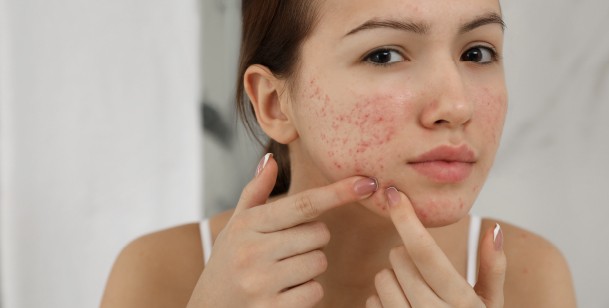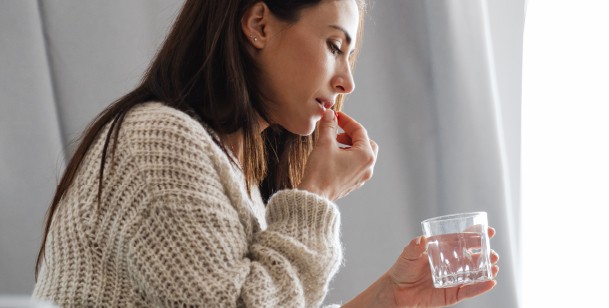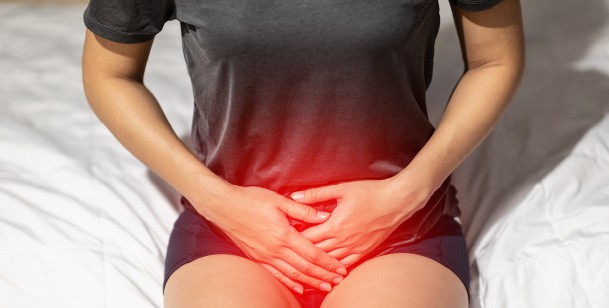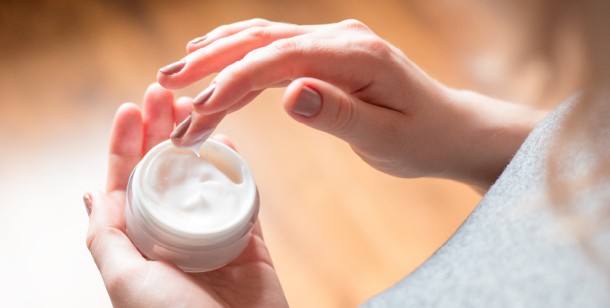Many people facing issues with severe acne have turned to Accutane for help. While the medication has proven itself to be a very powerful acne treatment, there have been reports of users having to deal with several, sometimes severe side effects. Despite the Food and Drug Administration (FDA) not listing yeast infections as a potential side effect of the medication, many people have reported cases of it while on the medication. So, can Accutane cause yeast infections?
In this article, we will explore what Accutane is, how it works, its possible side effects, and discover whether or not this medication has the potential to cause yeast infections for its female users. Plus, you will learn how to best prevent and care for vaginal yeast infections if one occurs.
What is Accutane?
Accutane, also known as Isotretinoin, is a long-term antibiotic prescribed for severe and treatment-resistant acne. This medication affects the skin’s oil glands, shrinking them in order to prevent the overproduction of the skin’s natural oils. Accutane has a high success rate, often resulting in blemish-free skin for those who use it.
However, Accutane is often considered a last resort for those looking for clearer skin, and is only prescribed after other, less aggressive, acne treatments have not been effective. This is because the prescription strength of the medication often comes with multiple potentially dangerous side effects. For this reason, Accutane users are heavily monitored by their physicians while taking the medication.

What are the Most Common Accutane Side Effects?
Many of the side effects of Accutane stem from the medication doing what it is formulated to do in ridding the skin of any excess oil in an attempt to unclog pores and prevent acne spots from forming.
However, in many cases, users report an overdrying of the skin. It is this extreme dryness that produces the medication’s most common side effects. Some of these side effects include:
- Irritation at the Corners of the Mouth
- Dry Eyes
- Itchy Peeling skin
- Dandruff
- Rashes
- Nose Bleeds
Because Accutane users will generally suffer from dehydration of the skin, it is advisable to avoid drinking alcohol and using a tanning bed while on the medication. These activities can further dehydrate the skin, which could potentially lead to a worsening of symptoms.
Symptoms not resulting from dry skin caused by Accutane can include:
- Sun Sensitivity
- Fatigue
- Muscle and Joint Weakness
- Resistance to Antibiotics
As previously stated, Accutane is a prescription-strength medication that can cause some potentially severe side effects. Persons wishing to begin taking Accutane should have an honest, in-depth discussion with their doctor before taking the medication to ensure that they fully understand the potential risks involved. The more severe, potential side effects of Accutane include:
- Premature Closing of the Ends of Bones (Adolescents taking Accutane who are not fully grown may experience this symptom.)
- Rosacea in Individuals Prone to the Condition (Even if they have never experienced a flair-up previously.)
- Hair Loss
- Eye Irritation
- Permanent Thinning of Skin
- Easy Bruising
- Altered Liver Enzymes
- Back Pain
- High Blood Sugar
- A Loss of Night Vision
- Calcified Cysts in Muscle Tissue
- Cataracts
- Cranial Hypertension
- Erectile Dysfunction
- Anxiety and Depression
- Thoughts of Suicide
Pregnant women are advised not to use Accutane, as there have been many reports of severe birth defects caused by the medication. Mothers using the medication during their first trimester risk exposing their child to chemicals via the bloodstream. In the event of exposure, Accutane can have a negative impact on the frontal lobe of the brain in unborn fetuses, causing delayed or abnormal development, or preventing the frontal lobe from forming entirely.
These abnormalities can cause a child to be born with severe learning disabilities. There have also been cases of spontaneous abortion due to anencephalic (brain-less) children. If you are currently taking Accutane and are pregnant or plan to become pregnant, please consult your doctor immediately.
Because of the severe risk Accutane causes to unborn children, women will be required to use an approved birth control method for one month before taking the medication, as well as one month after stopping it. Your physician can advise you on the approved methods of contraception to use while on Accutane.

Can Accutane Cause Yeast Infections?
Yes, Accutane can cause yeast infections, also known as vaginal candidiasis. While it is not listed as a side effect, yeast infections can result from the drying effects of the medication. Other possible causes of yeast infections include:
- Antibiotic Use
- Pregnancy
- Unregulated Diabetes
- An Impaired Immune System
- Increased Estrogen Levels
The vagina is self-lubricating, meaning that it naturally produces liquids that help maintain overall vaginal health. When this self-lubrication stops and the vaginal canal dries out, the balance of yeast and natural bacteria is altered allowing the yeast to overgrow and resulting in a yeast infection.

Symptoms of Yeast Infections
Symptoms of a common yeast infection can include:
- Itching and Irritation of the Vagina and Vulva
- Burning Sensations (Heightened during intercourse or urination)
- Redness and Swelling of the Vulva
- Vaginal Pain and Soreness
- Vaginal Rash
- Vaginal Discharge (Either thick, white, and odor-free or watery in consistency)
Treatments for Yeast Infections
There are many different treatments available for yeast infections. While some require prescriptions, most can be bought at your local drugstore. Short-course vaginal therapies (remedies that take effect after three to seven days) are available in several forms, including ointments, tablets, and suppositories. There are also single-dose oral medications available. For more severe or persistent yeast infections, schedule an appointment with your doctor.

How to Prevent Vaginal Dryness and Yeast Infections While on Accutane
The main remedy for all dry skin-related side effects caused by Accutane is to avoid subjecting the skin to additional irritation and dehydration and to moisturize consistently and effectively.
To help prevent vaginal dryness while taking Accutane, you can do the following:
- Wear Light, Clean Cotton or Satin Underwear
- Use Unscented Vaginal Lubricants
- Use Sexual Lubricants During Intercourse, if Needed
If you are experiencing vaginal dryness while taking Accutane, you can do the following to help prevent yeast infections:
- Wear Light, Clean Cotton or Satin Underwear
- Take a Daily Probiotic to Help Maintain a Healthy Vaginal pH level
- Avoid Internal Douching (This may create a bacterial imbalance in the vagina.)
Get the Care You Deserve at Village Emergency Centers
Can Accutane cause yeast infections? Yes, along with a variety of potentially uncomfortable symptoms. If you are taking Accutane and are experiencing a low quality of life due to any of the symptoms discussed above, reach out for help. A trusted physician can discuss your symptoms with you and recommend the best next steps.

